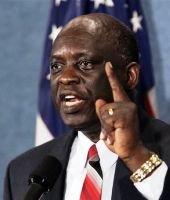Sudan’s ambassador to the US branded Darfur crisis as “genocide”
June 6, 2007 (WASHINGTON) — The Sudanese ambassador to the US John Ukec Lueth Ukec has labeled the conflict in Darfur as “genocide” when the crisis erupted three years ago. Ukec made that determination in an article he wrote in a local Iowa newspaper where he was residing.

The press conference was marked by the ambassador’s sharp rhetoric and his vigorous gestures as he blasted the US administration, calling the sanctions an outcome of “bi-partisan politics”.
Ukec denied that genocide has ever occured in Darfur and suggested that the US position on that is isolated from the rest of the world.
Below is the text of the article written by the Sudanese ambassador to Washington in 2004 at the Iowa State Daily.
“Genocide in Sudan, From One Who’s Been There.”
By John Lueth, Iowa State Daily Columnist
Sept. 21, 2004 — Iowa State University, and the world at large, are perplexed about the mass killings, rapings and human rights violations happening in the Darfur region of Western Sudan. Until recently, the international community has largely ignored the genocide, which has killed more than two million people in the last 20 years.
My country has been in turmoil since 1955. When the British left and Sudan gained independence, the Northern Sudanese (who are predominantly Muslim) placed a short leash on the Southern Sudanese (who are predominately Christian). In a move dubbed “internal colonialism,” North Sudan took control of the South and denied the South Sudanese positions as government administrators, teachers, police officers and other positions of importance.
The tribes of Darfur are sedentary farmers with their livelihood based on the land and a few domesticated animals. Alongside the African tribes are nomadic Arabs — with whom they have lived in relative harmony for thousands of years. These nomadic tribes have had disputes with the Africans in the past, but disputes of this sort, though common, have never lead to the magnitude of the current tragedy.
Until February 2003, all the violence and war in Sudan was between the North and South. But upon learning that the conflict between the North and South was being settled, the African tribes of Darfur launched a rebellion in February 2003 to end their oppression.
The Sudanese government responded to the rebellion of the Africans in Darfur by recruiting Arab tribes. They trained and mobilized them to do the fighting for the government. The Sudanese army and their arsenals backed this tribal militia, called the Janjaweed.
They are armed with rifles and mounted on horses. They raid villages, kill men, rape women and set villages on fire. Their incentive is to loot whatever they can get. Once the African farmers’ land is vacated, they take it for their own personal use.
The Sudanese government sees African farmers as sympathizers to the rebels. They think terrorizing them and making them run to Chad or Southern Sudan will deny the rebels safe haven, food and the ability to recruit more insurgents.
This horrible counter-insurgency strategy has been used by Sudan for decades. Arab militia called “Muraheleen” devastated South Sudan in the mid 1980s. They overran villages, killed Southern Sudanese in masses and took women and children into slavery. My cousin, wife and three children have been taken by the militia and are nowhere to be found.
Southern Sudanese like me are wondering why the world is waking up at last to the atrocities engineered by the Sudanese government. They pitch tribe against tribe, Muslims against Christians and now the Arab militia against the African population in Western Sudan.
The Africans and the Arab nomads have lived as neighbors for thousands of years without such a massacre of innocent civilians. The Sudanese government must be accountable for the genocide that has occurred.
However, calling upon the Sudanese government to disarm the Janjaweed is a fantasy. The Sudanese army is in alliance with a government that is unbreakable. In fact, the Janjaweed does the dirty work for the government.
For those of us at Iowa State and the world at-large, we need to help the displaced people by contributing anything that can mitigate their current situation. Clothing, shelter and food are very critical right now.
However, we as individuals must work to prevent atrocities by the government. The world organizations cannot deliver on the threats against the Sudanese government without pressure from each and every one of us.
There is a rich history between the Sudanese and Iowa State because of alumni from that country. We need to honor this bond by working together to stop the deplorable actions in Sudan.
*The text of the article provided courtesy of Steve Paterno, a Sudanese based in the USA
(ST)
